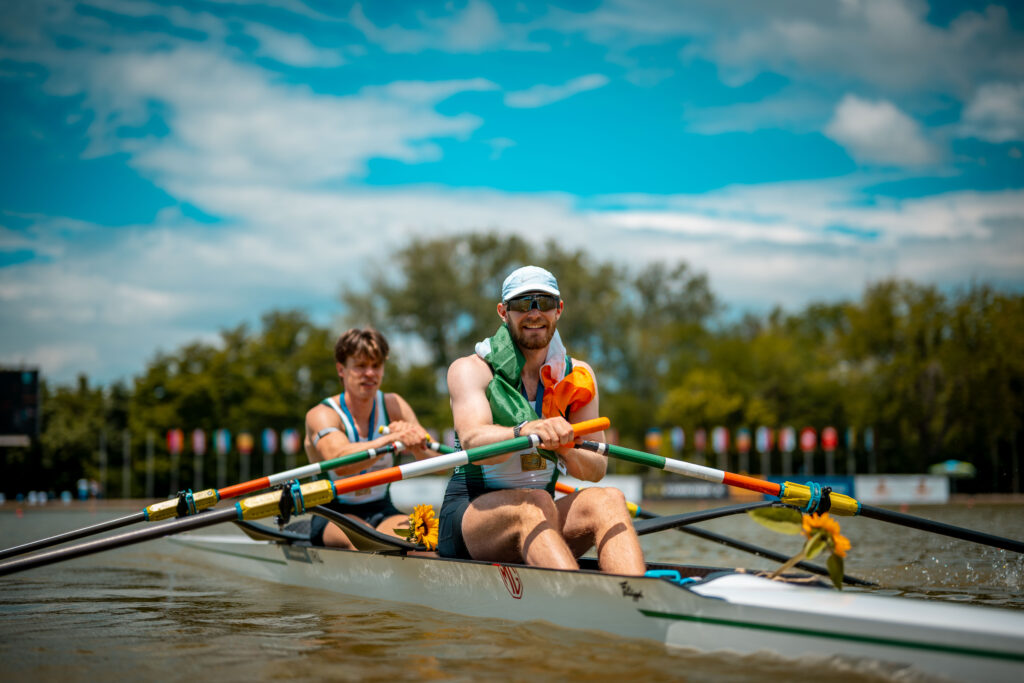
17 Jun 2025
Mental toughness propelling former lightweights to openweight success
At the Paris 2024 Olympic Games, Ireland and Great Britain became the last-ever Olympic champions in the lightweight double sculls. Lightweights’ removal from the Olympic programme led to plenty of questions about the future in rowing for those athletes who are naturally on the smaller side.
The 2025 European Rowing Championships and 2025 World Rowing Cup Varese have gone some way towards answering those questions, with the men’s and women’s double sculls events in particular attracting several former lightweights – who have shown they can be more than competitive in the openweight field.
In Plovdiv, the women’s double sculls final, the Greek crew of Zoi Fitsiou and Dimitra Kontou added a European silver medal to their Olympic lightweight women’s double sculls bronze medal, chasing down the Dutch in the closing metres and almost taking gold.
European bronze medallist Mariana-Laura Dumitru qualified the lightweight double sculls for Paris with 2023 world bronze – although was not selected for the Olympic Games. And Margaret Cremen of Ireland also made the final in Plovdiv, having finished fifth in the lightweight doubles in Paris.
On the men’s side, Ireland’s Fintan McCarthy won European bronze in the men’s double sculls, starting a new phase of his career after his spectacularly successful partnership with Paul O’Donovan that took the Irishmen to two Olympic gold medals. Italy’s Niels Torre and Gabriel Soares were fourth in the men’s double sculls final on Saturday in Plovdiv, and Switzerland’s Raphael Ahumada was sixth – only for Ahumada to win the World Cup in Varese, ahead of Soares and Torre.
Greece’s Evangelia Anastasiadou also made the final of the women’s single sculls in Bulgaria, finishing fourth – Anastasiadou has raced both openweight and lightweight for some time. And that’s without mentioning the former lightweights who missed out on A-finals in Plovdiv, but were still competitive, in several different boat classes.
Those who have decided to stick with rowing say they are happy with their choice, appreciating the extra strength and power that the lack of weight limits brings to training and racing.

“It’s been great, we can eat as much as we like, we can drink as much water as we like. We realised it’s a different sport and regattas are actually kind of fun,” says McCarthy.
Cremen agrees, saying: “Even in training fuelling ourselves a bit better is just so much nicer. It’s like an extra gear really, a new lease of life. It’s exciting to see how much we can push our bodies even further.”
Soares adds: “It’s a new experience. It’s different and it’s good to enjoy. It’s always rowing, but it’s really different for us.
“During the training when we do starts we are powerful like a heavyweight now, so it’s good to start and stay close to the other boats,” he says.
Fitsiou thinks there is little difference in speed between lightweights and openweights in any case – and indeed in Paris, albeit with finals raced on different days, the lightweight double sculls posted faster times than their openweight counterparts.
“For us it’s almost the same, because the mentality’s always the same for racing. It’s just a little bit easier psychologically because now we can eat whenever we want. But all the other – the training, the way we work as a double is the same,” argues Fitsiou.
“Lightweight and heavyweight categories didn’t have much of a difference timewise. I knew we were going to be fast, but it’s a new season after the Olympics, there are a lot of new doubles, so we were really curious to see what the other countries had to bring to the field.”
And the lightweights also think they have developed the mentality you need to be a tough racer during their careers.
“When we race as lightweights I think we have a lot of things about mentality to control, because of the weight cut and because we are all at the same weight, so it’s difficult to pass the crew who we compete against,” says Soares.
“We always had to dig deep in every single lightweight race, so it toughened us up an awful lot and that really prepared us for the step up to heavyweight,” adds Cremen.
McCarthy says smaller athletes can also be technically superior.
“We’ve probably spent our whole careers so far trying to move the boat for our size, and get the most that we can out of our littler bodies, so now we’re a bit bigger maybe who knows what will happen?” he laughs.
The love of rowing is what is keeping the former lightweights in the sport, ready to compete against all comers.
“Paris could have been the perfect ending – lightweight finishing, having been to two Olympics – but the reason for me anyway that I kept going is because I love being part of the rowing community and it’s my family, it’s my circle and I wasn’t ready to give that up,” Cremen says.
“It’s the lifestyle now, isn’t it? I feel like we’re part of the furniture now at these regattas and it’d be hard to give it up. We love it, and we have such a good time with each other, I think we’re going to keep going as long as we can and as long as we’re enjoying it,” McCarthy concludes.

